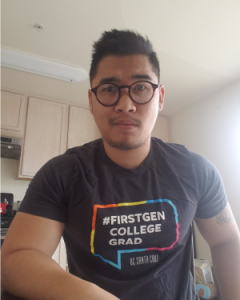First-Gen Graduate Student: Trung Pq Nguyen (History Of Consciousness)
 I grew up in East Side San Jose, a predominantly working class, immigrant, and people of color neighborhood in the Bay Area. I grew up in a crowded refugee household; my parents fled Vietnam in 1979 as part of the hundreds of thousands who believed that the boat was safer than land. They lived in the Galang Refugee camp in Indonesia for 3 years before they were sponsored by a church in Michigan. My parents had no more than a middle school education since their lives were disrupted by war. They couldn’t continue after being sponsored because we struggled to make ends meet. While they worked and made sure we had enough food to eat, my sister and I were able to go to school.
I grew up in East Side San Jose, a predominantly working class, immigrant, and people of color neighborhood in the Bay Area. I grew up in a crowded refugee household; my parents fled Vietnam in 1979 as part of the hundreds of thousands who believed that the boat was safer than land. They lived in the Galang Refugee camp in Indonesia for 3 years before they were sponsored by a church in Michigan. My parents had no more than a middle school education since their lives were disrupted by war. They couldn’t continue after being sponsored because we struggled to make ends meet. While they worked and made sure we had enough food to eat, my sister and I were able to go to school.
What motivated me to go to college: I saw college as one path out of poverty; I grew up seeing my parents and extended family members struggle with low-wage work, unemployment, substance abuse, and incarceration. I didn’t want this, and school was one place that promised a different kind of future, so I kept going.
What the biggest challenge I encountered was as a first-generation student and how I overcame it: I struggled with a lot of the social and cultural differences that my peers from higher-income backgrounds had. It seemed as if everybody had a plan and the resources for how to succeed in college; for me, the goal was to simply get in. I hadn’t thought about what I would actually do once I got there. I constantly felt out of place and three steps behind everybody else, academically and otherwise. I at least was smart enough to realize I was struggling and motivated enough to not want to go back to East Side San Jose without a degree in hand. I sought out others like me on the campus, and tried everything that the university offered. I eventually found a number of other first-generation students, with whom I was able to share resources, politics, and institutional knowledge. Having this social and political community helped me flourish in an otherwise hostile place.
How my background has helped me: Since I had few networks to fall back on, I had to teach myself a lot of things, and I had to teach myself fast. Knowing how to learn quickly, adapt to new situations, and prioritize what was important has allowed me to pursue paths that others might not.
What I would tell my first-year self: It’s okay to not have it all figured out. Take it a day at a time and be present in the moment. Remember that by virtue of being in college, you are now incredibly privileged and have so many opportunities now available, so realize there is more than you can do now rather than can’t do.
The best thing about my college experience so far has been: Being a part of student-organized movements for justice on the local and state level.
How being a first-generation student influences me (and/or my work) now: Popular narratives about refugees too often portray the post-resettlement experience in positive terms: that the refugee can finally have freedom, safety, happiness, and so forth now that they are away from imminent danger. Growing in a refugee household, I saw that this was not at all the case. My family, and many like mine, experienced other forms and conditions of abandonment, racism, exploitation, and violence after resettlement. Part of my work looks at what kinds of political imaginations of solidarity refugees and other communities of non-citizens produce after and in spite of protracted experiences of war, disillusionment, and abandonment.
